Emily specializes in SEO, content marketing, social media strategy, and PPC campaigns. She is particularly skilled at analyzing market trends and adapting strategies to stay ahead of the curve.
Imagine you’re looking to lose a little weight.
You’re searching online for the best weight loss plans.
You type “most effective weight loss plans” into the search bar and hit enter.
The search engine offers you two types of results.
At the top are bold, bright ads shouting “Fast Weight Loss Program” or “Get 50% Off” on a product they are selling, and below them, you find a series of articles and blog posts titled “The 15 Best Weight Loss Programs of 2023.”
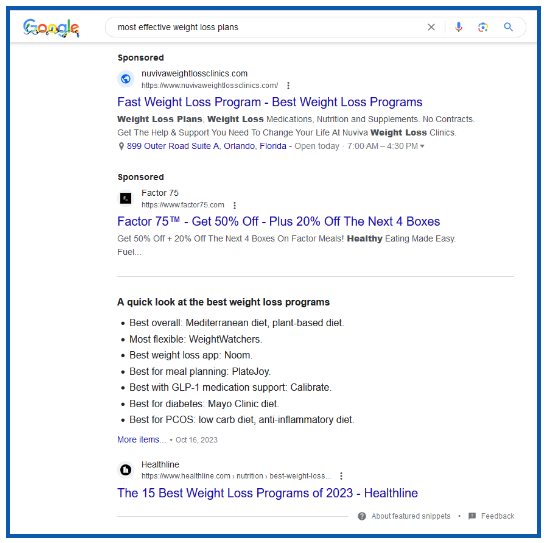
Which one do you click?
If you’re like most people, you’ll likely skip the ads and click on the organic search results.
Why? The answer lies in trust.
Trust plays a pivotal role in our decision-making process, particularly when it comes to decisions about our health and well-being.
Studies show that people generally trust organic search results more than paid ads.
This trust translates into higher engagement rates and a greater likelihood of following through on the advice or products found through organic searches.
But why is this the case?
Let’s find out.
The Perception of Credibility
Picture search engines like Google as a high-tech matchmaker.
Its job? To connect people with the most relevant, top-quality content based on what they’re searching for.
This process is driven by complex algorithms that sift through heaps of data to find the best match for every query.
Now, compare this with paid ads.
These are the spots that businesses pay for to appear at the top of search results.
The fundamental difference here? It’s like the difference between earning a medal and buying a trophy.

And in the digital world (especially in high-trust industries), earning your spot is everything.
Why? Because people generally trust organic results more.
They’re seen as more credible, more genuine.
If a website makes it to the first page of Google organically, it’s like getting a seal of approval from the search engine.
And trust is huge when it comes to influencing how people behave online.
To put it into perspective, about 53% of all web traffic comes from organic search, compared to just 15% from paid search.
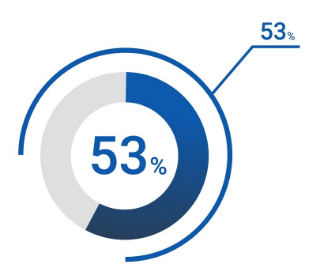
Why this significant difference, you ask? It boils down to credibility.
When people scroll through search results, there’s a natural inclination to trust organic listings more.
People generally believe that if a site has climbed its way to the first page of Google, it must have proven its worth.
They’re not just there because someone paid for the spot; they’re there because they’re seen as valuable and relevant.
So, when we say trust is a powerful factor, we’re not exaggerating.
It’s in our nature to lean towards things that have stood the test of time, things that have proven their worth.
That’s why when a website earns a high ranking on a search engine’s first page, it’s more than just a good spot.
It’s a badge of trust.
So, when a search engine places a website on its coveted first page, people tend to view it as a reliable, credible source.
And in the realm of SEO, building and maintaining this level of trust can be a game-changer for any high-trust industry.
It’s not just about being seen; it’s about being recognized as a trustworthy authority in your field.
Let’s zero in on another key factor that makes organic search results so powerful: relevance.
Here’s a fascinating fact: A study by Forrester revealed that 71% of consumers kick off their journey by using a search engine to discover new products and services.
And 74% use it for the entire decision-making process, from research to purchase.
That includes researching, comparing, and actually making the transaction.
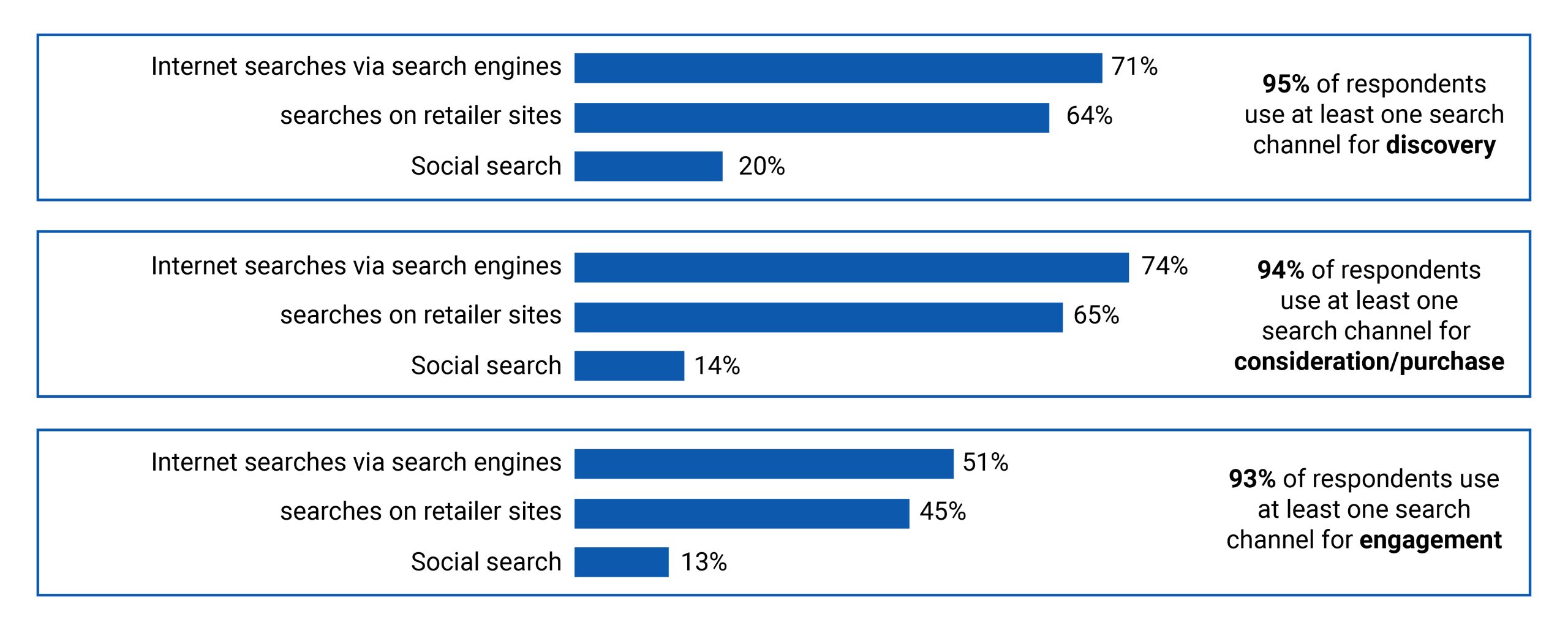
Here’s what this means for you: when someone types a query into a search engine, they’re not just randomly browsing.
They’re on a mission. They’re looking for information that speaks directly to their needs, whether it’s solving a problem, answering a question, or finding a specific product or service.
The closer your content aligns with their search, the more engaged they’ll be.
This is where organic search truly excels.
It’s like having a conversation with your audience, where you’re providing the exact answers they’re looking for.
Organic search results are tailored by sophisticated algorithms that analyze web content to match user queries with the most relevant information.
It’s a highly targeted process, ensuring that people find what they need in your content.
Now, let’s compare this with paid ads.
Sure, you can target specific keywords and demographics in paid campaigns, but at the end of the day, ads are ads.
They’re promotional by nature. People know this and often perceive these ads as less about providing valuable information and more about selling something.
It’s like being at a party where someone is constantly trying to sell you something rather than having a genuine conversation.

It’s a subtle but crucial difference.
In the end, relevance is important in the world of search engines.
People can sense when content truly addresses their needs versus when it’s just another sales pitch.
It’s not just about visibility; it’s about connecting the right information or solution to the right person at the right time.
And staying relevant isn’t just good practice; it’s critical for your online success.
Higher Engagement Rates
Because of credibility and relevance, people are way more likely to interact with organic listings.
And by interaction, I mean all the good stuff: clicking on links, spending quality time on your webpage, sharing your content, and engaging in conversations through comments.
This interaction, or engagement, is like a gold star for your content.
It tells us that people find what you’re offering valuable and relevant.
More engagement not only boosts your site’s credibility but also skyrockets its visibility in search results.
Let’s go back to our example of weight loss plans.
If someone lands on your blog post titled “The 15 Best Weight Loss Programs of 2023,” they’re not just going to take a quick glance and leave.
They’re likely to dive deep into your article and explore each of your recommendations, and if they really find it useful, they might even share it with their friends.
This level of engagement is gold, and it’s something you rarely see with paid ads.
Paid ads might grab attention, but often, they’re seen as intrusive, and that can turn people off.
Now, why should businesses care about engagement? Simple.
Engagement is a critical metric to how successful your online presence is.
High engagement rates lead to better brand recognition, stronger customer relationships, and, ultimately, more sales.
Here’s a study that compares the click-through rates (CTRs) of organic and paid search results.
The table below shows the average CTRs for the first eight search results that a person sees after typing a query into Google Search.
A maximum of four sponsored results (ads) and ten organic search results are displayed.
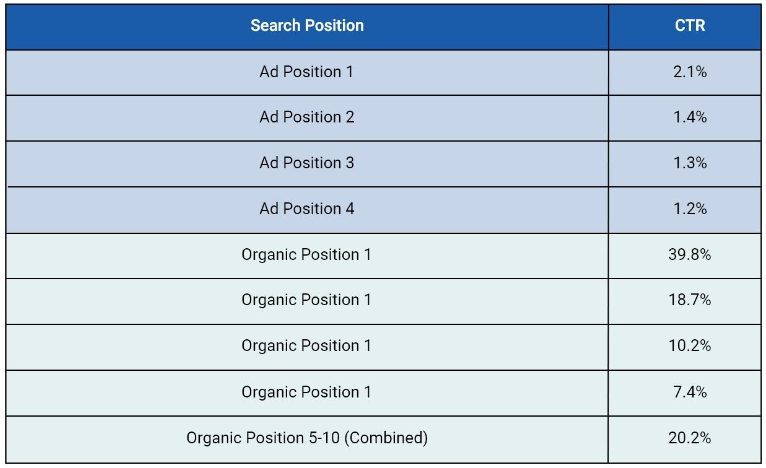
As you can see, organic search results clearly receive a far larger share of overall clicks than paid results.
So, as we navigate your SEO strategy, remember: it’s not just about getting traffic; it’s about getting traffic that engages, believes in, and advocates for your brand.
That’s the real power of organic search.
Let’s really get into the meat of what makes organic traffic so valuable.
It’s not just about drawing people to your website; it’s about turning those visitors into paying customers.
And that’s where organic traffic excels.
As I mentioned earlier, organic search is responsible for 53% of all website traffic.
But here’s the kicker – it’s also responsible for about 40% of your revenue.
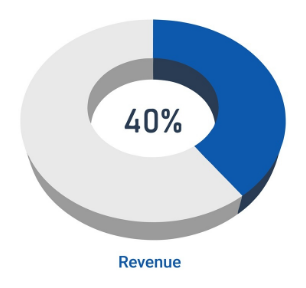
(The revenue generated by organic traffic depends on factors such as the industry, the quality of the website, and the effectiveness of the SEO strategy).
But as you can see, the potential is huge.
According to a Databox poll, 70% of respondents claimed SEO is the channel that generated the most sales for their businesses through organic traffic.
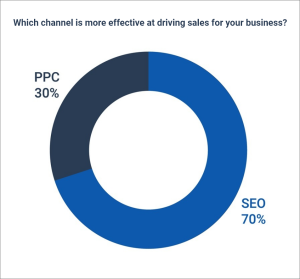
Why does organic search convert so well? Trust and credibility.
When people find your site through a search engine, they’re more likely to trust it.
And when they trust your site, they’re more willing to make a purchase, sign up for your newsletter, or take whatever action you’re hoping for.
Sure, paid ads do generate traffic to your site.
But they don’t always lead to conversions.
Why? Because people tend to see paid ads as less trustworthy.
They know someone paid to be there, which makes people skeptical.
This skepticism can lead to a lower conversion rate, meaning you might not get the best return on your investment.
So, as we wrap up this article, let’s remember the key takeaways:
In the world of digital marketing for high-trust industries, trust isn’t just important – it’s everything.
And when it comes to earning that trust, organic traffic is your golden ticket.
People turn to organic search results when they’re looking for content that’s not just relevant but also trustworthy.
While paid ads definitely have their role, they just can’t match the level of credibility and relevance that comes with organic listings.
Our goal is to climb those organic search rankings, and we do this through tried-and-true SEO best practices.
This isn’t just about driving more traffic to your site; it’s about building a foundation of trust.
Remember, the end game here isn’t just to get a bunch of clicks. It’s about providing real value, making genuine connections, and turning those clicks into lasting relationships.
And that, my friends, is the real power of organic traffic.